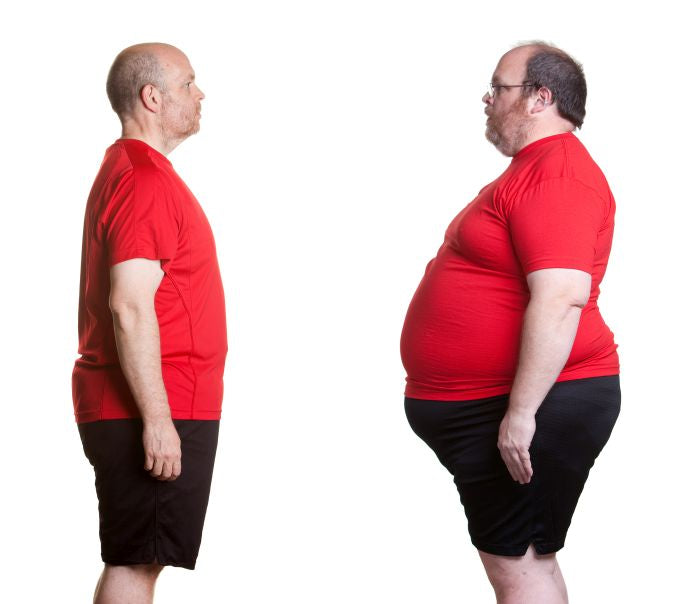In his article “4 Ways to Get Firm by Lowering Firmicutes”, Alan Christianson, NMD, gives fascinating insight into the importance of having the correct ratio of gut bacteria if you want to achieve and maintain your ideal weight. When it comes to weight gain, his article explains that “it’s them, not you.”
Alan Christianson writes, “One of the biggest myths about obesity is that it’s caused by laziness or indulgence. It’s not. It’s caused by your body reacting to stressors.
“In response to stress, your body will store food to prepare for famine, and you will gain weight. Some stressors are obvious, but many are not. Some are as silent and invisible as the bacteria in our intestines.
“In a startling study(1), Dr. Gewirtz at Cornell University showed that the weight of mice could be changed by over 15 percent just by shifting their intestinal bacteria. Along with weight changes, the bacteria present changed the mice’s chemistry in ways that could predict heart disease, high blood pressure and risks for diabetes. Related work(2) has shown this same connection to intestinal bacteria also exists in humans. In fact, transplanting bacteria from the intestinal tracts of obese humans has been shown to trigger obesity in normal-weight mice.(3)
“How can bacteria cause weight gain, and how can you make sure your bacteria do not?
“First, it’s important to realize that 99 percent of our intestinal bacteria are unable to use oxygen. Bacteria that can’t use oxygen are called anaerobes. This is important because all the foods with bacteria (like sauerkraut and yogurt) — as well as all the bacteria in probiotic supplements – only contain bacteria that live in oxygen. These foods and supplements—terrific as they may be— have little or no effect on the anaerobes that run the show.
“Of the many types of anaerobes, the two that are most directly involved with obesity are the Bacteroidetes and Firmicutes. Most studies have shown that the more Bacteroidetes you have (compared to your Firmicutes), the leaner you will be. So, if you want to be "firm and cute", you want more Bacteroidetes, and fewer Firmicutes.
“The reason these bacteria affect our weight is because they regulate how much fat we absorb. Imagine two identical twins eating exactly 2,000 calories, but with different ratios of Bacteroidetes to Firmicutes. The one with the higher ratio of Firmicutes to Bacteroidetes will absorb more calories than the other and be more apt to gain weight while eating the exact same diet. (4)
“In light of the growing rates of obesity, a good question to ask would be, “what is causing these bacteria to shift in ways that would lead to weight gain?
“One explanation is the remarkable changes in our lifestyle over the past few decades. We now:
- Use more antimicrobial soaps and hand sanitizers.
- Are exposed to more environmental pollutants.
- Live under higher amounts of stress.
“It’s easy to see the effect of the hand sanitizers and environmental pollutants. Antimicrobial soaps and hand sanitizers are problems because they kill good bacteria as well as bad ones. Environmental pollutants are toxic to good bacteria, just as they’re toxic to us.. But the connection of stress to bacteria is less obvious. How could stress affect bacteria?
“Here’s how. Mental and emotional stress triggers the release of adrenal stress hormones, like cortisol and adrenaline. These stress hormones act on the brain and stimulate the vagus nerve, an important nerve that forms a kind of circuit between the brain and the heart, lungs and, tellingly, the gut .. Stress reduces the blood supply needed to properly digest foods and manage the balance of bacteria. And this tie between your brain and gut is a two-way street, because stress hurts your digestion, and poor digestion makes you feel more stressed. When this vicious cycle gets rolling, your Bacteroidetes are reduced, and you gain weight more easily.
“Here are some things you can do to help yourself right now:
- Eat a high-fiber diet with good carbs. Because Firmicutes are needed to absorb fats, higher fat diets cause you to have more of them, leading to weight gain.(5)
- Avoid sugars and processed carbs. Firmicutes are so well-suited to grow on sugars that they’re known to grow rampantly in factories that process sugar-cane into table sugar.(6)
- Raise your intake of beans. Beans are among the very best foods to raise your Bacteroidetes.(7) If you can’t digest beans, that’s likely a sign that you have too few Bacteroidetes. But rather than avoid beans completely, studies(8) have shown that if you add beans into your diet slowly, and stick with them, the symptoms will go away. To train your bacteria to digest beans well, I encourage you to add just 1 tablespoon of pinto beans daily to the evening meal for two weeks. After two weeks, most people are able to digest more typical amounts.
- Sleep and eat on a regular schedule. Cutting-edge data(9) have shown that our intestinal bacteria have a rhythm that changes throughout the day just like our sleep-wake cycle. Shift work, jet lag and erratic meal times can hurt our good bacteria just like antibiotics can.
“The old way of thinking was that you could only get healthy through strenuous effort and deprivation.
“That wasn’t fun, and it didn’t work anyway.
“The new way of thinking about health is very different. Far from being based on pain and suffering, being truly healthy, lean and energized turns out to be a product of being at peace— and in sync with the world around you.”
REFERENCES
- https://www.ncbi.nlm.nih.gov/pubmed/20203013
- https://www.ncbi.nlm.nih.gov/pubmed/18779823
- http://www.nature.com/ismej/journal/v7/n4/full/ismej2012153a.html
- https://www.ncbi.nlm.nih.gov/pubmed/19043404
- https://www.ncbi.nlm.nih.gov/pubmed/20508158
- http://www.nature.com/articles/srep03107
- http://www.nature.com/articles/ni0111-5.epdf?referrer_access_token=vL7jxMmtMFm-J4FsmHepUdRgN0jAjWel9jnR3ZoTv0PAiPQVX4O0BwVZ-fYGp-TIYMqF2kFy186abTGLBRFRKUWapmh9JaLzh5h23wzZqenyhLfamjFCg-s5fygJWl65wZJ0pmLfUMqLKeY6cJbKFdL3fym_h8tRfKdgobiJutcaHLo265C0-7JeJCdvU7qt_HT0vFEd5fPIA1ZSHrE-kjkYFSNMlEZoNUr3mqzaqSm_KYtDi1M8YUlXsZKlZE7VZXdslBYfNL58vLPKW2zH7w%3D%3D&tracking_referrer=www.huffingtonpost.com
- https://www.ncbi.nlm.nih.gov/pubmed/22104320
- http://www.cell.com/abstract/S0092-8674%2814%2901236-7

